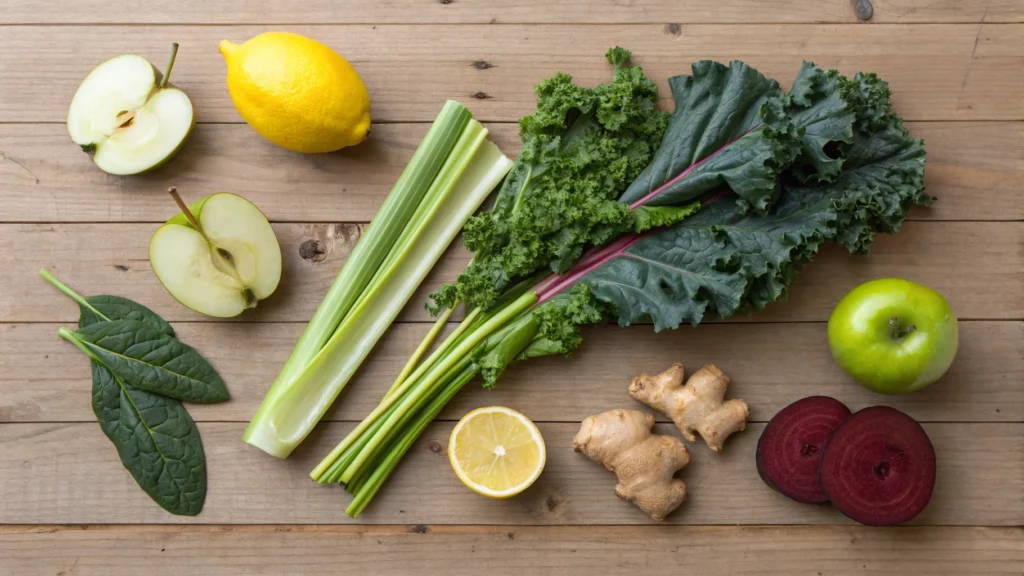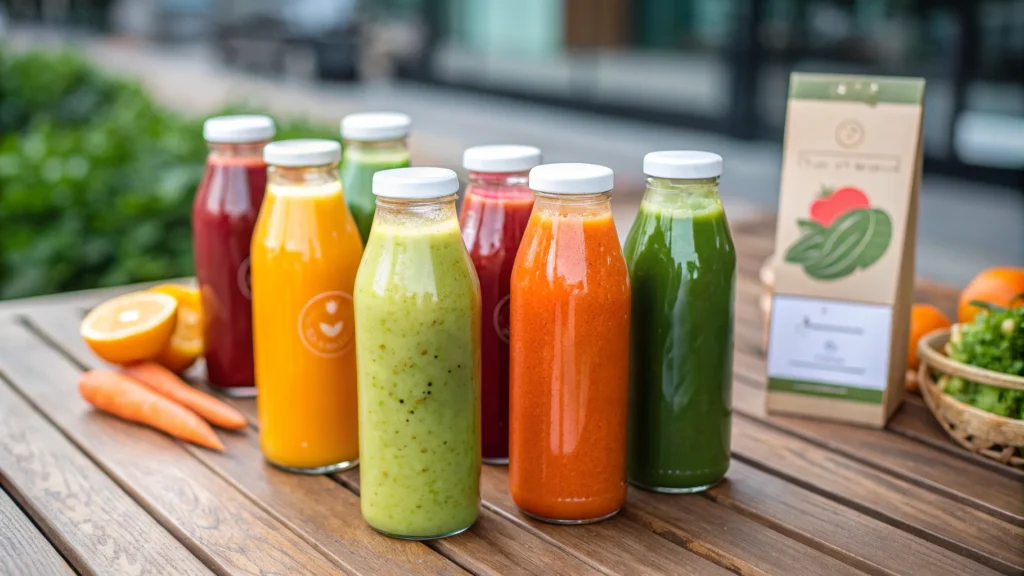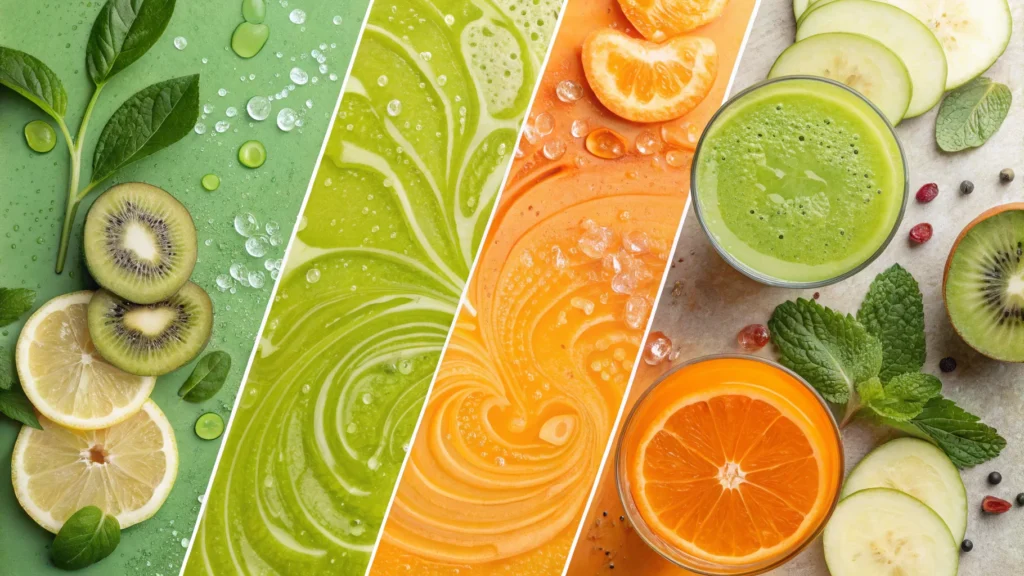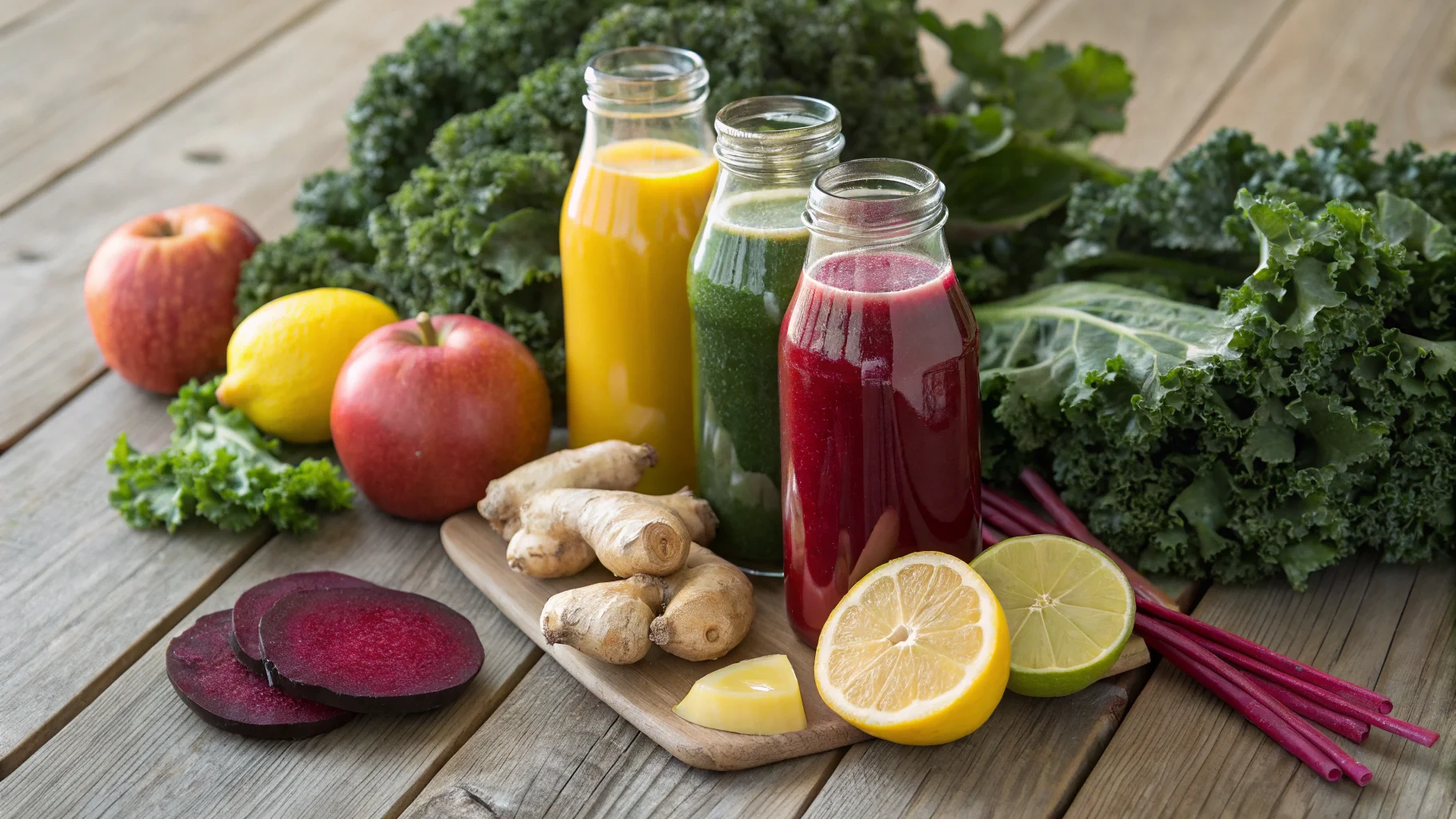Juice cleansing has become a popular way to detox, reset digestion, and jumpstart a healthier lifestyle. Many people wonder, “Is 3 days enough for a juice cleanse?”—and the answer isn’t always straightforward. A three-day cleanse can provide several benefits, including improved digestion, increased hydration, and short-term weight loss. However, it also comes with some challenges, such as potential fatigue and hunger.
In this article, we’ll explore the benefits and drawbacks of a 3-day juice cleanse, what happens to your body during the process, and how to prepare for the best results. By the end, you’ll have a clear understanding of whether a three-day cleanse is the right choice for you.
Let’s start by breaking down what a juice cleanse actually is and why people choose to do it.
Table of contents
- Introduction to Juice Cleansing
- Benefits of a 3-Day Juice Cleanse
- Potential Risks and Drawbacks
- What Happens to Your Body During a 3-Day Juice Cleanse?
- How to Prepare for a 3-Day Juice Cleanse
- Best Practices During a Juice Cleanse
- Breaking the Cleanse Safely
- FAQs – What People Also Ask About a 3-Day Juice Cleanse
- Conclusion – Is 3 Days Enough for a Juice Cleanse?
Introduction to Juice Cleansing
What Is a Juice Cleanse?
A juice cleanse is a short-term diet where individuals consume only fruit and vegetable juices, eliminating solid foods. The goal? To give the digestive system a break while flooding the body with essential vitamins, minerals, and antioxidants. Some people opt for a one-day cleanse, while others extend it to five or even seven days. However, a 3-day cleanse is the most common choice due to its balance between effectiveness and manageability.
During a juice cleanse, you typically drink six to eight servings of fresh, cold-pressed juices daily. These juices often include ingredients like kale, spinach, beets, celery, lemon, ginger, and apples, providing a mix of nutrients while keeping calorie intake low.
Common Durations of Juice Cleanses
Juice cleanses vary in length, and each duration serves a different purpose:
- 1-day cleanse: A gentle reset, perfect for beginners.
- 3-day cleanse: The most popular option, offering a deeper detox while remaining manageable.
- 5-7 day cleanse: A more intense detox, recommended for experienced individuals.
- 10+ day cleanse: Less common and should be done under medical supervision.
While some claim that longer cleanses lead to deeper detoxification, even a 3-day juice cleanse can be enough to experience noticeable benefits.
Why 3 Days Is a Popular Choice
A three-day cleanse strikes a balance between achievability and effectiveness. It’s long enough for your body to enter detox mode, yet short enough to avoid extreme side effects. Here’s why many choose a 3-day juice cleanse:
- Easier to commit to compared to longer cleanses.
- Helps reset cravings and reduce sugar dependence.
- Gives digestion a break without excessive deprivation.
- Can kickstart healthier eating habits post-cleanse.
However, before diving in, it’s essential to understand both the potential benefits and drawbacks of a juice cleanse. Up next, we’ll explore the benefits of a 3-day juice cleanse and whether it’s worth the effort. 🚀

Benefits of a 3-Day Juice Cleanse
A 3-day juice cleanse is often seen as a quick way to reset the body, boost energy, and support overall wellness. But is 3 days enough for a juice cleanse to make a difference? While results vary, many people experience noticeable benefits in just a few days.
Detoxification and Cleansing the Body
One of the biggest reasons people try a juice cleanse is to flush out toxins. While the body naturally detoxifies through the liver and kidneys, a juice cleanse provides essential nutrients that support these processes. Ingredients like lemon, ginger, and leafy greens help the body eliminate waste more efficiently.
Drinking only juice for three days also reduces exposure to processed foods, artificial additives, and excess sugar, which can give your digestive system a break. Though a juice cleanse won’t magically remove toxins, it may help the body function more efficiently.
Potential Weight Loss Benefits
Many people notice a drop in weight during a 3-day juice cleanse, mainly due to reduced calorie intake and water loss. Since juices are low in calories but high in nutrients, the body burns stored fat for energy.
However, it’s important to note that most weight lost is water weight, not long-term fat loss. If you return to unhealthy eating habits after the cleanse, the weight may come back quickly. That’s why a juice cleanse works best when followed by a balanced diet.
Boosting Energy and Mental Clarity
During the first day of a cleanse, some may experience fatigue. But by Day 2 or 3, many people report feeling more energized and focused. Without processed foods and caffeine crashes, energy levels may become more stable.
Fresh juices contain natural sugars and essential vitamins that help the brain function optimally. This can lead to better focus, fewer mood swings, and improved productivity.
Improving Digestion and Gut Health
Since juices are easier to digest than solid foods, a cleanse can give the digestive system a much-needed break. Ingredients like ginger, celery, and aloe vera may reduce bloating and promote gut health.
Additionally, a juice cleanse helps increase hydration, which is essential for a healthy digestive system. Drinking plenty of water-rich juices can improve bowel movements and reduce bloating.
Although a 3-day juice cleanse has several benefits, it’s important to consider potential drawbacks before committing. Let’s dive into the risks and side effects you should be aware of.
Potential Risks and Drawbacks
While juice cleanses offer several benefits, they aren’t for everyone. Some people experience side effects, and others may find that a juice-only diet isn’t sustainable. So, is 3 days enough for a juice cleanse to be worth it? That depends on how your body reacts.
Nutrient Deficiencies and Lack of Protein
One of the biggest concerns with juice cleansing is nutrient imbalances. While fresh juices are packed with vitamins and antioxidants, they lack protein, healthy fats, and fiber—key nutrients needed for long-term health.
Without protein, muscle loss can occur, and low fiber intake may lead to digestive issues. Some people modify their cleanse by adding plant-based protein sources like almond milk or chia seeds to maintain balance.
Possible Side Effects (Fatigue, Headaches, and Cravings)
A sudden drop in calorie intake can cause headaches, dizziness, and fatigue, especially on the first day. This happens because the body is adjusting to a lower energy supply.
Cravings are also common, as your body may miss solid foods and proteins. Some people experience irritability or mood swings, particularly if they are used to a diet high in processed foods.
Who Should Avoid Juice Cleansing?
A 3-day juice cleanse isn’t suitable for everyone. If you have diabetes, low blood sugar, or a history of eating disorders, it’s best to avoid extreme juice fasts. Pregnant women, children, and individuals with certain medical conditions should also consult a doctor before trying a cleanse.
If you experience severe symptoms like nausea, dizziness, or extreme weakness, it’s a sign that your body may not be responding well. Listening to your body is key!
Now that we’ve covered the benefits and risks, let’s take a look at what actually happens to your body during a 3-day juice cleanse.
What Happens to Your Body During a 3-Day Juice Cleanse?
So, is 3 days enough for a juice cleanse to create real changes in your body? Let’s break down what happens during each day of the cleanse.
Day 1: Detox Symptoms Begin
The first day can be the toughest. As you eliminate caffeine, sugar, and processed foods, your body starts adjusting. You might experience:
- Fatigue or mild headaches due to sugar withdrawal.
- Increased urination, as juices contain high water content.
- Hunger cravings, especially if you usually eat high-calorie meals.
Staying hydrated and drinking plenty of herbal tea can help manage these symptoms.
Day 2: Adjustment Phase and Increased Hydration
By the second day, your body is adapting to the juice cleanse. Energy levels may start to stabilize, and digestion slows down due to lack of fiber. Benefits often include:
- Reduced bloating as your digestive system rests.
- More hydration from increased fluid intake.
Some people still experience cravings, but they typically lessen by the end of Day 2.
Day 3: Cleansing and Reset Effects
By Day 3, many people report feeling lighter, more energized, and refreshed. Your body has adjusted, and you may notice:
- Glowing skin from improved hydration.
- Less bloating as your digestive system gets a break.
- A new sense of discipline and mindfulness around eating habits.
However, it’s important to transition back to solid foods properly after a cleanse to avoid digestive discomfort. That’s where preparation becomes key.

How to Prepare for a 3-Day Juice Cleanse
Preparation is crucial for a successful juice cleanse. Jumping in too fast can lead to intense cravings, mood swings, and fatigue. So, how should you prepare?
Foods to Eat Before the Cleanse
A few days before starting, it’s best to gradually transition into a juice cleanse by eating:
- Fresh fruits and vegetables
- Whole grains like quinoa and brown rice
- Plant-based proteins like lentils and chickpeas
- Healthy fats like avocados, nuts, and seeds
Avoid processed foods, caffeine, sugar… as they can make detox symptoms worse.
How to Reduce Caffeine and Sugar Intake
If you drink coffee or soda daily, cutting them off suddenly can lead to headaches and fatigue. Instead, start by:
- Switching to herbal tea or decaf coffee.
- Reducing sugar intake by replacing desserts with fruit.
- Drinking more water and coconut water for hydration.
Setting Realistic Expectations
A 3-day juice cleanse is not a magical fix, but it can help reset eating habits. Understanding that it’s a temporary cleanse rather than a long-term solution will help you stay motivated
Best Practices During a Juice Cleanse
Now that you’ve started your 3-day juice cleanse, it’s essential to follow some best practices to make the experience smoother and more effective. Is 3 days enough for a juice cleanse? That depends on how well you manage the process.
Staying Hydrated with Water and Herbal Teas
Juices provide hydration, but drinking extra water and herbal teas is crucial to support detoxification. Proper hydration:
- Helps flush out toxins and waste.
- Reduces headaches and dizziness caused by calorie restriction.
- Keeps digestion running smoothly, even without solid food.
Aim for at least eight glasses of water daily, and try teas like ginger, peppermint, or chamomile to soothe digestion.
Listening to Your Body and Adjusting as Needed
Not everyone reacts the same way to a juice cleanse. If you feel excessively weak, dizzy, or nauseous, it’s okay to adjust. Consider:
- Adding a small handful of nuts or avocado for healthy fats.
- Drinking a blended smoothie instead of pure juice for extra fiber.
- Eating a light vegetable soup if hunger becomes overwhelming.
Juice cleansing should be a refreshing, not punishing experience. Listening to your body ensures you stay safe and comfortable throughout the process.
The Importance of Rest and Light Activity
Since you’re consuming fewer calories, it’s best to avoid intense workouts. Instead, focus on:
- Light activities like stretching.
- Short walks to boost circulation and digestion.
- Plenty of rest and sleep to help the body recover.
Following these best practices will help you feel energized and balanced. But once the cleanse is over, it’s equally important to transition back to solid food safely.
Breaking the Cleanse Safely
Coming off a juice cleanse is just as important as the cleanse itself. If you immediately go back to heavy, processed foods, it can cause digestive discomfort and undo your progress.
Why You Should Reintroduce Foods Gradually
Your digestive system has been on a break for three days. To avoid bloating, gas, or stomach pain, reintroduce foods slowly by:
- Starting with light, water-rich fruits and veggies like cucumbers and melons.
- Eating small portions and chewing food thoroughly.
- Avoiding processed foods, dairy, and meat for at least 24-48 hours.
Jumping back into heavy meals too quickly can lead to bloating and sluggishness.
Best Foods to Eat After a Juice Cleanse
The first day after your cleanse, stick to gentle, nourishing foods, such as:
- Steamed vegetables (broccoli, carrots, zucchini).
- Soups and broths (vegetable broth…).
- Soft whole foods (avocado, oats, quinoa).
Gradually reintroduce proteins and dairy after the second or third day.
Avoiding Common Post-Cleanse Mistakes
To maintain the benefits of your 3-day juice cleanse, avoid:
- Overeating or indulging in junk food
- Drinking caffeine immediately after.
- Ignoring hydration and portion control.

FAQs – What People Also Ask About a 3-Day Juice Cleanse
Many people considering a juice cleanse have common concerns about its effectiveness and safety. Below, we answer some of the most frequently asked questions.
Is a 3-day juice cleanse enough to detox the body?
The body naturally detoxes through the liver and kidneys, so a juice cleanse isn’t necessary for detoxification. However, eliminating processed foods and consuming nutrient-dense juices for three days can help your digestive system reset and reduce inflammation.
How much weight can you lose on a 3-day juice cleanse?
Weight loss varies based on metabolism and activity levels, but most people lose 2-5 pounds, mainly from water weight and reduced bloating. Keep in mind, this isn’t long-term fat loss, and maintaining results requires healthy eating post-cleanse.
Can you exercise during a juice cleanse?
Light activities like walking and stretching are ideal, but intense workouts may lead to fatigue since juice cleanses provide fewer calories. Listen to your body and prioritize rest if needed.
What happens if you do a juice cleanse for longer than 3 days?
Extended juice cleanses can lead to nutrient deficiencies, muscle loss, and fatigue due to the lack of protein and fiber. Consulting a healthcare professional before attempting a longer cleanse is always recommended.
For more delicious and nutritious juice recipes to complement your cleanse, check out our 3-Day Juice Cleanse Recipes. This guide provides easy and refreshing juice combinations to help you get the most out of your detox journey!
Conclusion – Is 3 Days Enough for a Juice Cleanse?
So, is 3 days enough for a juice cleanse to make a difference? Yes and no. A 3-day juice cleanse can help reset eating habits, improve hydration, and reduce bloating. However, it’s not a long-term solution for weight loss or deep detoxification.
If done correctly, a juice cleanse can be a refreshing reset, but sustainable health comes from balanced nutrition and lifestyle choices. If you’re considering a cleanse, prepare properly, listen to your body, and transition back to whole foods mindfully.

